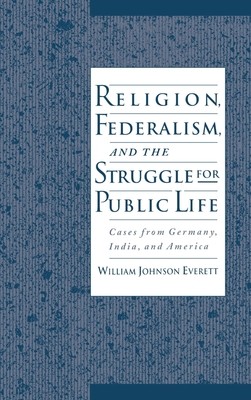
- We will send in 10–14 business days.
- Author: William Johnson Everett
- Publisher: Oxford University Press, USA
- ISBN-10: 0195103742
- ISBN-13: 9780195103748
- Format: 16.2 x 23.7 x 2.1 cm, kieti viršeliai
- Language: English
- SAVE -10% with code: EXTRA
Religion, Federalism, and the Struggle for Public Life (e-book) (used book) | bookbook.eu
Reviews
Description
In the past decade, the struggle for new forms of federal order and public life has exploded in central Europe, the former Soviet Union, and South Africa. Religious traditions and organizations have played a crucial role in these revolutions, and have also been critical to the establishment of constitutional orders in post-colonial countries like India. Moreover, they continue to undergird and to challenge the understanding of public life in the United States, whether in church-state conflicts or Native American religious claims. William Everett examines the role of religious traditions in the development of modern federal republicanism, seeking answers to such questions as: How have patterns of religious organization shaped federal republican orders? How do different cultures weave together these political and religious threads into a living fabric that fits their own cultural heritage? How are Western religious traditions of covenant and conciliarism relevant for understanding
religion and constitutional developments in non-Western cultures? The author argues that a better comparative grasp of these dynamics is essential to our understanding of the establishment, sustenance, and development of federal republican governance. He presents, as a first step toward this goal, a detailed and comparative study of these patterns in India, Germany, and the United States.
EXTRA 10 % discount with code: EXTRA
The promotion ends in 23d.11:00:52
The discount code is valid when purchasing from 10 €. Discounts do not stack.
- Author: William Johnson Everett
- Publisher: Oxford University Press, USA
- ISBN-10: 0195103742
- ISBN-13: 9780195103748
- Format: 16.2 x 23.7 x 2.1 cm, kieti viršeliai
- Language: English English
In the past decade, the struggle for new forms of federal order and public life has exploded in central Europe, the former Soviet Union, and South Africa. Religious traditions and organizations have played a crucial role in these revolutions, and have also been critical to the establishment of constitutional orders in post-colonial countries like India. Moreover, they continue to undergird and to challenge the understanding of public life in the United States, whether in church-state conflicts or Native American religious claims. William Everett examines the role of religious traditions in the development of modern federal republicanism, seeking answers to such questions as: How have patterns of religious organization shaped federal republican orders? How do different cultures weave together these political and religious threads into a living fabric that fits their own cultural heritage? How are Western religious traditions of covenant and conciliarism relevant for understanding
religion and constitutional developments in non-Western cultures? The author argues that a better comparative grasp of these dynamics is essential to our understanding of the establishment, sustenance, and development of federal republican governance. He presents, as a first step toward this goal, a detailed and comparative study of these patterns in India, Germany, and the United States.


Reviews